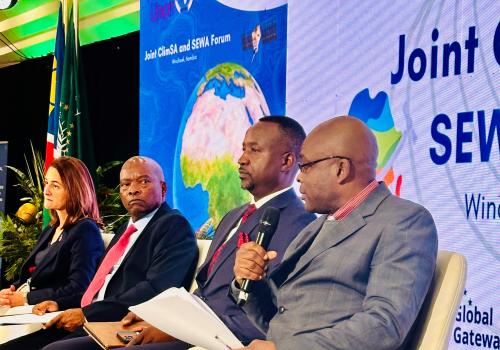Namibia Hosts Landmark Forum on Climate Services and Space-Based Early Warning for Africa
Windhoek, Namibia – From 23 to 27 June 2025, the Government of the Republic of Namibia welcomed delegates from across Africa and beyond for the Joint Forum of the Intra-ACP Climate Services and Related Applications (ClimSA) Programme and the Space-based Earth Observation for Early Warning in Africa (SEWA) initiative in the capital city of Windhoek. Organised by the African Union Commission (AUC) and the Southern African Development Community (SADC), in partnership with the Government of the Republic of Namibia, the Forum brought together policymakers, technical experts, and development partners in a landmark effort to strengthen Africa’s climate resilience and early warning capabilities.
Held under the theme “Accelerating Access to Climate and Weather Services for Resilient African Economies and Communities,” the Forum served as a strategic platform to reflect on ClimSA’s progress and to officially launch SEWA; a groundbreaking initiative harnessing space-based technologies to enhance early warning systems across the continent.
The Forum enabled dynamic exchanges on the progress made under ClimSA in delivering targeted climate information services to critical sectors such as agriculture, disaster risk reduction, health, and water. Member States shared best practices on integrating climate services into national development strategies, enhancing institutional coordination, and scaling up local adaptation initiatives.
Dr. Patrice Kabeya, Senior Programme Officer at the SADC Secretariat, represented the SADC Executive Secretary, His Excellency Mr. Elias Magosi, at the Joint ClimSA and SEWA Forum. Delivering remarks on behalf of the Secretariat, Dr. Kabeya reaffirmed SADC’s strong commitment to advancing regional cooperation in climate services and early warning systems.
In his statement, Dr. Kabeya emphasised that the twin initiatives of ClimSA and SEWA align closely with SADC’s strategic priorities on climate resilience, disaster risk reduction, and sustainable development. He highlighted the importance of science-based planning, institutional coordination, and investment in user-oriented services as key to safeguarding lives and livelihoods in the region.
“On behalf of the SADC Executive Secretary, I wish to commend the African Union Commission and all partners involved for convening this important Forum. The ClimSA and SEWA programmes are critical instruments that will enable our region to better anticipate, prepare for, and respond to climate-related risks,” he stated.
Dr. Kabeya also underscored the need to ensure that the benefits of climate services and space-based technologies reach communities at the grassroots level, particularly smallholder farmers, women, and vulnerable populations who are most at risk from climate shocks.
A major highlight was the official launch of SEWA, which will utilise Earth observation technologies to enhance the timeliness, accuracy, and reach of early warning systems. This milestone positions Africa at the forefront of space-based infrastructure for disaster preparedness, climate forecasting, and risk management.
Additionally, the Forum provided a platform for strategic dialogue among Regional Climate Centres (RCCs), National Meteorological and Hydrological Services (NMHSs), and sectoral ministries, further strengthening regional cooperation in climate action and early warning governance.
As Africa confronts the growing impacts of climate change including extreme weather events, prolonged droughts, floods, and rising food insecurity access to accurate, timely, and locally relevant climate information is no longer optional; it is essential. The Joint ClimSA and SEWA Forum reinforced the pressing need for investment in early warning systems, data sharing, and user-oriented climate services.
The Forum sent a clear message: climate resilience is not a privilege; it is a necessity. It is central to protecting lives, preserving livelihoods, and enabling sustainable development. By building institutional capacity and fostering cross-border partnerships, the Forum laid a strong foundation for a more climate-informed, responsive, and resilient Africa.

